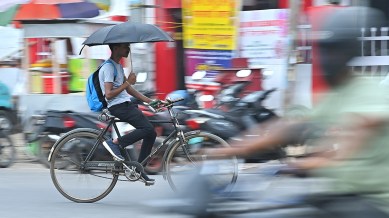Stay updated with the latest - Click here to follow us on Instagram
GST 2.0 tax slash brings cheers to consumers, industry says ‘inverted duty continues to hurt’
The prices of milk sold by cooperatives like Verka have decreased by Re 1 to Rs 2 per litre, as announced by Punjab Chief Minister Bhagwant Mann last week.

The implementation of GST 2.0 on Monday, which reduced the prices of several essential and consumer goods, brought some relief to consumers. However, industrialists in Punjab cautioned against the inverted duty structure, which they said continued to hurt them. An Inverted tax structure refers to a condition where the tax rate on inputs used is higher than the tax rate on the outputs for sale. The condition may not be for all industries.
Punjab, the bicycle hub of India, witnessed one of the sharpest reductions in the GST on bicycles, from 12 per cent to 5 per cent, a drop of 7 percentage points.
monthly limit of free stories.
with an Express account.
Gurmeet Singh Kular, chief of the Federation of Industrial and Commercial Organisation (FICO), said, “The price of an ordinary black bicycle (basic model) in the Rs 3,000-Rs 3,500 range has fallen by Rs 200-Rs 300 per unit… fancy bicycles in the Rs 6,000-Rs 7,000 range have become cheaper by Rs 500-Rs 600, and so have the prices of other models.”
Kular, however, cautioned the inverted duty structure continues to hurt the industry. “Steel and plastic used in manufacturing bicycles are taxed at 18 per cent, while the sale of bicycles is at 5 per cent. Earlier, the gap was 6 per cent, but now it is 13 per cent. Besides, delayed GST refund blocks manufacturers’ money.”
Agricultural machinery has also become cheaper in the agrarian state of Punjab.
Upkar Singh, president of the Chamber of Industrial and Commercial Undertakings (CICU), said, “If a person buys a new tractor for around Rs 6 lakh, he will have to pay around Rs 40,000 less tax, while a rotavator costing Rs 1 lakh will be cheaper by Rs 7,000.”
Welcoming “the GST cut as a relief to farmers,” Upkar Singh pressed for a solution to the inverted duty structure. “The GST on the sale of a tractor or a rotavator or other agricultural machinery or equipment has been reduced from 12 to 5 per cent, but the raw material…steel used in the manufacturing is taxed at 18 per cent.”
Sonu Nilibar, president of the Punjab Cloth Merchant Association, said, “Readymade garments priced below Rs 2,500 will now attract only 5 per cent GST, while earlier readymade garments priced at Rs 1,000 and above were taxed at 12 per cent, and readymade garments below Rs 1,000 were taxed at 5 per cent. However, garments above Rs 2,500 will be taxed at 18 per cent instead of 12 per cent earlier.” Nilibar said, “Shopkeepers have started displaying old and new price tags to clarify the changes for customers. People wearing clothes priced below Rs 2,500 will be at some relief. During this wedding season, clothing items priced above Rs 2,500 will be subject to higher taxes.. No doubt the sale of unstitched clothes (saree, suit length, etc) will continue attracting the same 5 per cent GST as before.”
The prices of milk sold by cooperatives like Verka have decreased by Re 1 to Rs 2 per litre, as announced by Punjab Chief Minister Bhagwant Mann last week. However, not all sectors are upbeat.
Badish Jindal, president of the World MSME Forum, pointed out that the GST on coal has been hiked from 5 to 18 per cent, and transport services also face higher taxation. “I don’t buy the idea that inflation will reduce. The cost of electricity, transportation, and other services will rise, even though prices for bicycles, tractors, and some ready-made clothing have slightly decreased. The inverted duty structure has left manufacturers confused, and it remains to be seen whether this is really a reason to celebrate.”
“While the 5 per cent option offers lower upfront tax for those not availing ITC, the 18 per cent rate may raise costs for logistics operators depending on credits, potentially pushing up prices of goods movement in the long run, and Punjab heavily depends upon transport services, and hence, will end up paying more,” Jindal said.
Gurpreet Singh Patti Sadik, a farmer from Abohar, said, “I have to buy a 4×4 tractor… It is priced at Rs 7.1 lakh. It will now be around Rs 70,000 cheaper due to a GST reduction. We expect the Union government to reduce GST on pesticides.”
Didar Singh Dhillon, a farmer from Malakpur in Ludhiana, has been planning to buy a rotavator, which will cost him Rs 7,000 less. “…I have been waiting for September 22 for the tax reduction, and will buy the rotavator this week.”